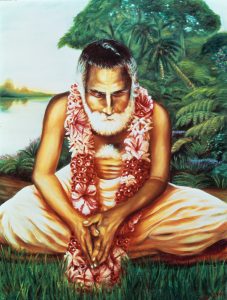
Excerpt from a lecture given in Hilo, Hawaii on February 7, 2005 by Śrīla Bhaktivedānta Nārāyaṇa Mahārāja (Purebhakti.com)
Once, Śrīla Prabhupāda Bhaktisiddhānta Sarasvatī Ṭhākura sent some devotees to preach in Bengal, and they preached very well. They wanted to establish a preaching centre there, and they asked Śrīla Prabhupāda Sarasvatī Ṭhākura, “What should we do?” He replied, “I will be very happy if you establish a preaching centre, and when you are ready I will come there with many devotees.” They began preparing the preaching centre – working day and night – making it very good with all kinds of equipment so that Śrīla Prabhupāda would come there and be happy. They made a temple in that centre, and the Deities were ready and waiting to be installed by  Śrīla Prabhupāda.
Śrīla Prabhupāda.
Śrīla Prabhupāda arrived at the temple at mid-day, he saw everything, and he became pleased. Then he asked, “Where is the brahmacārī who came here first and worked so hard.” They told him, “Master, that devotee was a very good brahmacārī, but then he became entangled with a lady. We rebuked him so much for his behaviour that he fled from this place.”
Śrīla Prabhupāda said, “I don’t want to establish a preaching centre here, nor do I want to install the Deities. You know, in this world we spend hundreds of gallons of blood to bring a person out of the clutches of māyā, and if that person makes some mistake, it will be washed away by his serving Hari, Guru,  and Vaiṣṇavas. But you have chastised him and he has gone away. So I don’t want to make a centre here. Search for him and bring him to me; otherwise I will go away.”
and Vaiṣṇavas. But you have chastised him and he has gone away. So I don’t want to make a centre here. Search for him and bring him to me; otherwise I will go away.”
All the disciples became very anxious, and they began searching everywhere for that brahmacārī who was entangled with a lady. Śrīpāda Mādhava Mahārāja, who at that time was named Hayagrīva brahmacārī, somehow discovered his whereabouts. He apologized to that brahmacārī, and said, “Please excuse me. Śrīla Prabhupāda is very unhappy with us. Please come.”
The brahmacārī began to weep, saying, “Prabhupāda is very merciful. I was serving here, in a watch company, but I was not really happy. I wanted to return, but I was thinking, ‘How can I show my face?’ So I did not return. But Śrīla Prabhupāda has called. What endless mercy he has! He is more merciful than Lord Kṛṣṇa.” He at once went running and weeping to Śrīla Prabhupāda, fell flat at his Guru Mahārāja’s lotus feet, and all his anarthas were washed away in a moment.
So, don’t criticize anyone – neither a devotee nor a worldly person. It has been told in Śrīmad-Bhāgavatam (11.28.1-2):
śrī-bhagavān uvāca
para-svabhāva-karmāṇi
na praśaṁsen na garhayet
viśvam ekāmakaṁ paśyan
prakṛtyā puruṣeṇa ca
“The Supreme Personality of Godhead said: ‘One should neither praise nor criticize the conditioned nature and activities of other persons. Rather, one should see this world as simply the combination of material nature and the enjoying souls, all based on the one Absolute Truth.”
para-svabhāva-karmāṇi
yaḥ praśaṁsati nindati
sa āśu bhraśyate svārthād
asaty abhiniveśataḥ
“Whoever indulges in praising or criticizing the qualities and behaviour of others will quickly become deviated from his own best interest by his entanglement in illusory dualities.”
Don’t glorify worldly persons, whether they are good or bad. If you do so, all their bad activities will come in you and your life will be spoiled.
To bring a person from the clutches of māyā is very, very hard. If lust or any other attachment is present in that person’s heart, it will go away very soon, if he is chanting and remembering and listening to hari-kathā. Be very careful. Don’t criticize devotees – or non-devotees. First look at your own condition, and try to purify yourself. Is there any lust in you? Is there any kuṭināṭī (deceit) in you, or not? Be worried for that; don’t worry for others. Śrī Guru and Lord Śrī Kṛṣṇa are responsible for others. You cannot do anything to help them, so you have no right to criticize.

From a lecture given at Śrī Rūpa-Sanātana Gauḍīya Maṭha in Vṛndāvana on February 2, 1994 by Śrīla Bhaktivedānta Nārāyaṇa Mahārāja (Śrī Hari-kathāmṛta Volume Two)
Gather all his things, place them on a bullock cart and send him away
Once, to encourage one of his disciples, Prabhupāda wrote him a letter that said, “In the whole of Māyāpura there is no Vaiṣṇava like you. You are an exalted Vaiṣṇava and you are doing a great deal of service.” In reality the man’s conduct was very poor and he wasn’t doing any service at all, but Prabhupāda wrote this just to encourage him. Upon receiving this letter, that man became very proud. He began thinking, “There is no greater Vaiṣṇava in Māyāpura than myself. If there is any great Vaiṣṇava, it is me. Not Narahari Prabhu, Vinoda Brahmacāri or anyone else here is as advanced as myself.”
Then he began criticising all the devotees. When Prabhupāda came to know of it, he said, “He has started criticising everyone? To cure his disease, I gave him a remedy, but instead his disease has merely increased?” Mahāprabhu said the same thing: “I came to this world to cure the living entities’ disease and engage them in serving Bhagavān. Yet they commit offences, criticise me and now they are making a plan to beat me.” For this reason he took sannyāsa. Concerning this man, Prabhupāda said, “He is a great offender. He doesn’t respect  any Vaiṣṇava. Vinoda, throw him out of the maṭha. Help him gather all his things, place them on a bullock cart and send him away.” Gurudeva offered praṇāma to Prabhupāda, then went and hid somewhere. When that night Prabhupāda realised that the man had still not been expelled from the maṭha, he called some other devotees and had him thrown out. Later Prabhupāda called my gurudeva and said to him, “I told you to throw that man out of the maṭha and you didn’t do it—why?” With folded hands, Gurudeva said, “You are the authority here and you have independent, free will. You told me today to throw that man out, but perhaps in a few days you may be asking me why I did it. You are a very merciful guru; all of Bhagavān’s mercy is embodied in you. Please tell me why you had this devotee thrown out of the maṭha. It appears that you mercilessly threw him out. Can any guru do this?” Prabhupāda replied that he was forced to do this in this situation because the entire atmosphere amongst the devotees could have been spoiled. When a hand is very wounded and there is the possibility of gangrene, if the hand is not amputated the entire body will die. The guru can correct anyone but correcting a vaiṣṇava-aparādhi is very, very difficult. But even for such an offender generally the guru will patiently wait and allow time for his conduct to improve. He will not reject such a person so easily.
any Vaiṣṇava. Vinoda, throw him out of the maṭha. Help him gather all his things, place them on a bullock cart and send him away.” Gurudeva offered praṇāma to Prabhupāda, then went and hid somewhere. When that night Prabhupāda realised that the man had still not been expelled from the maṭha, he called some other devotees and had him thrown out. Later Prabhupāda called my gurudeva and said to him, “I told you to throw that man out of the maṭha and you didn’t do it—why?” With folded hands, Gurudeva said, “You are the authority here and you have independent, free will. You told me today to throw that man out, but perhaps in a few days you may be asking me why I did it. You are a very merciful guru; all of Bhagavān’s mercy is embodied in you. Please tell me why you had this devotee thrown out of the maṭha. It appears that you mercilessly threw him out. Can any guru do this?” Prabhupāda replied that he was forced to do this in this situation because the entire atmosphere amongst the devotees could have been spoiled. When a hand is very wounded and there is the possibility of gangrene, if the hand is not amputated the entire body will die. The guru can correct anyone but correcting a vaiṣṇava-aparādhi is very, very difficult. But even for such an offender generally the guru will patiently wait and allow time for his conduct to improve. He will not reject such a person so easily.
There is another story concerning my gurudeva’s compassion. In the early days of our maṭha in Navadvīpa there was a devotee named Narasiṁha Mahārāja, who was Śrīla Vāmana Mahārāja’s uncle. In reality Narasiṁha Mahārāja was very beautiful like a siṁha, or lion—very handsome and well built. He was a very small man but very clever. He was very straightforward and never duplicitous. His character was just as a Vaiṣṇava’s should be. Bhaktivinoda Ṭhakura writes in Kalyāṇa-kalpataru:
antare-bāhire, sama vyavahāra,
amānī mānada ha’bô
“However I feel in the core of my heart, I will behave accordingly, totally free from duplicity. Without demanding any respect, I will give all honour to others.”
Once a problem arose in the maṭha. A new devotee had come and taken initiation. He would only chant hari-nāma and he would not do any service. Narasiṁha Mahārāja told him to leave the maṭha and he was thrown out. Then this devotee stood crying at the maṭha gate with his luggage. Someone went and told my gurudeva that Narasiṁha Mahārāja had thrown a devotee out and that this devotee was standing at the maṭha gate crying. Then Gurudeva called Narasiṁha Mahārāja. Although they were similar in age, Narasiṁha Mahārāja considered him to be his guru. Gurudeva said to him, “Look, all of you got together and made me the ācārya. You should all please make the arrangements for all the service in the maṭha and do everything else. But please leave one  thing only up to me: if someone is to be thrown out of the maṭha, it should only be done with my permission.”
thing only up to me: if someone is to be thrown out of the maṭha, it should only be done with my permission.”
Why did Gurudeva say this? He was very compassionate. He didn’t consider it was anyone’s place to finish another devotee’s hari-bhajana over a small matter. An ordinary person cannot understand this mentality. Only after thorough deliberation can this point be understood. A scorpion was lying in the water. A sādhu came and lifted it out, but in the course of doing that the scorpion stung him. Then the scorpion fell back into the water. After a little while the sādhu lifted it out again, and again it stung him and fell back into the water. This process was repeated several times. Then the sādhu’s companion said to him, “Why are you doing this? Time and again the scorpion stings you and time and again you lift it out of the water.” The sādhu replied, “Its nature is to sting others and my nature is to help others. If it can’t abandon its nature, how can I abandon mine?” The nature of sādhus is like this.
Even if a devotee has a bad character, as long as he hasn’t committed aparādha the guru will not reject him. The guru knows that if he were to withdraw his mercy, that devotee would be even more lost in māyā. Although the guru is very powerful like a lion, he is also very compassionate and merciful.

Excerpt from the book My Beloved Masters by Śrīla Bhakti Vijñāna Bhāratī Mahārāja (page 179)
One Dvādaśī day, all the devotees were seated in a line waiting to honour prasāda. Just as prasāda was finished being served, one brahmacārī removed a particular sannyāsī’s leaf plate, threw it away and ordered the sannyāsī to leave that place and never return. Witnessing such behaviour, Śrīla Purī Gosvāmī Mahārāja became gravely upset and said, “I cannot remain here any longer. For so many years I have stayed with Śrī Bhakti Dayita Mādhava Mahārāja, whose standards for diligently serving Vaiṣṇavas are renowned. Śrī Mādhava Mahārāja demonstrated those standards through his conduct, and he served even those who opposed him.” A few devotees tried their best to pacify Śrīla Purī Gosvāmī Mahārāja, but were unsuccessful. Śrīla Mahārāja then quoted Śrīla Kavirāja Gosvāmī:
mahāntera apamāna ĵe deśa-grāme haya
eka janāra doṣe saba deśa ujāḍaya
Śrī Caitanya-cairtāmṛta (Antya-līlā 3.164)
He explained, “The entire village must suffer if even one person living there insults a great personality. This can be seen in the life of Rāmacandra Khān. His offense to Haridāsa Ṭhākura later led to him offending Śrī Nityānanda Prabhu, and subsequently, his entire village was destroyed as a result. And when Devānanda Paṇḍita remained a mute spectator while his students dragged Śrīvasa Paṇḍita out of his assembly, he too was implicated in that offence and became deprived of Mahaprabhu’s mercy. “While narrating the instance of Dakṣa Prajāpati and Satī, Śrīmad-Bhāgavatam asserts that if one cannot punish a vaiṣṇava-aparādhī by either cutting out his tongue or publically rendering him speechless through scriptural arguments, then one is required to leave that place.” This incident inspired Śrīla Purī Gosvāmī Mahārāja to write a multitude of essays on the subject of vaiṣṇava-aparādha, including the grave consequences of committing such offenses.
be seen in the life of Rāmacandra Khān. His offense to Haridāsa Ṭhākura later led to him offending Śrī Nityānanda Prabhu, and subsequently, his entire village was destroyed as a result. And when Devānanda Paṇḍita remained a mute spectator while his students dragged Śrīvasa Paṇḍita out of his assembly, he too was implicated in that offence and became deprived of Mahaprabhu’s mercy. “While narrating the instance of Dakṣa Prajāpati and Satī, Śrīmad-Bhāgavatam asserts that if one cannot punish a vaiṣṇava-aparādhī by either cutting out his tongue or publically rendering him speechless through scriptural arguments, then one is required to leave that place.” This incident inspired Śrīla Purī Gosvāmī Mahārāja to write a multitude of essays on the subject of vaiṣṇava-aparādha, including the grave consequences of committing such offenses.

Excerpt from the book My Beloved Masters by Śrīla Bhakti Vijñāna Bhāratī Mahārāja (page 294)
Śrīpāda Kṛṣṇa-keśava Brahmacārī once chastised a person he had inspired to join the maṭha. That person responded by saying, “If you weren’t such an old man, I would have grabbed you and forcibly thrown you out of the maṭha.” Śrīpāda Keśava Prabhu made no rebuttal, but rather remained silent. After I repeatedly asked him about the incident, he finally said, “There is a difference of heaven and earth between the era we live in today and that of bygone times. Previously, people felt forever indebted to those who helped them even slightly. But nowadays, not to speak of a scent of gratitude, people feel no shame in arguing with and falsely accusing those who have helped them. Their only motivation for such quarrels is to receive recognition and fulfil their selfish desires. There was a time when, what to speak of those in positions of authority, everyone in the maṭha desired to increase the maṭha’s number of sevakas. But now we see that many of those holding high posts do not object to expelling devotees from the maṭha.
“This reminds me of an old story,” he continued. “Once, a man put what he thought was a turtle egg in a pond, because turtles help protect water by eating many polluting entities. But when the egg hatched, he discovered it  was actually a crocodile egg. He now had a pond with a crocodile that wanted to eat him, the same person who had put the egg in the pond.” I told Śrīpāda Kṛṣṇa-keśava Brahmacārī, “You have served both Śrīla Prabhupāda and Guru Mahārāja so much. You should never have to endure any sort of inconvenience. When government employees retire, they receive a pension. Bhagavān’s is the biggest government. How could those who have served Him not possibly receive a pension? In this world, a pensioner must go to the bank and prove his identity before he receives any funds. But Bhagavān’s devotees receive their pension automatically, without having to go anywhere. You have never collected any money for yourself; you have lived your whole life as a totally renounced Vaiṣṇava. Although they have never met you, devotees both here and abroad joyfully exclaim ‘All glories to Prabhupāda’s cook!’ whenever they hear about you. There are plenty of people who would happily donate to serve you. Do not concern yourself with the actions or words of others. You have nothing to worry about.” “I know all this very well,” he told me. “I am not worried for my maintenance. I worry only for those who, though residing with sādhus, are unable to take full advantage of their association. These persons are unable to realize that they must taste the fruits of their actions. Where, then, must they go to experience a change of heart? Anyway, I can only pray for Bhagavān to bring them auspiciousness. May Śrīla Prabhupāda rest his auspicious gaze on all of us.”
was actually a crocodile egg. He now had a pond with a crocodile that wanted to eat him, the same person who had put the egg in the pond.” I told Śrīpāda Kṛṣṇa-keśava Brahmacārī, “You have served both Śrīla Prabhupāda and Guru Mahārāja so much. You should never have to endure any sort of inconvenience. When government employees retire, they receive a pension. Bhagavān’s is the biggest government. How could those who have served Him not possibly receive a pension? In this world, a pensioner must go to the bank and prove his identity before he receives any funds. But Bhagavān’s devotees receive their pension automatically, without having to go anywhere. You have never collected any money for yourself; you have lived your whole life as a totally renounced Vaiṣṇava. Although they have never met you, devotees both here and abroad joyfully exclaim ‘All glories to Prabhupāda’s cook!’ whenever they hear about you. There are plenty of people who would happily donate to serve you. Do not concern yourself with the actions or words of others. You have nothing to worry about.” “I know all this very well,” he told me. “I am not worried for my maintenance. I worry only for those who, though residing with sādhus, are unable to take full advantage of their association. These persons are unable to realize that they must taste the fruits of their actions. Where, then, must they go to experience a change of heart? Anyway, I can only pray for Bhagavān to bring them auspiciousness. May Śrīla Prabhupāda rest his auspicious gaze on all of us.”

Excerpt from the book My Śikṣā-guru and Priya-bandhu by Śrīla Bhaktivedānta Nārāyaṇa Mahārāja (page 8)
Then I told him, “I want to say something to them.” He at once became inspired and called to them, “Oh, all of you, come near and hear Nārāyaṇa Mahārāja. Please take into your hearts what he is speaking.” Then I told them all, “Don’t think that Śrīla Svāmī Mahārāja is leaving this world. Gurudeva is eternal. You are fortunate to have such a bona fide guru and Vaiṣṇava. You should try to preach his mission more and more enthusiastically. ![]() If you are after material things, you will find yourselves quarrelling over name, fame, and worldly gain. You will not be following his teachings. You will not be following his mission; you’ll be doing wrong. So don’t pursue your own self-interest. Give up all these things. To serve Śrīla Svāmī Mahārāja, and to preach his mission, you should be united with all the devotees. Don’t quarrel with others over a small point. Don’t expel anyone from this mission by finding small faults. Try to behave like friends, with brotherhood, and then you can preach. If you have difficulty with any of these things, then, as Śrīla Svāmī Mahārāja has requested me, you can come to me and I will try to help you from the core of my heart.”
If you are after material things, you will find yourselves quarrelling over name, fame, and worldly gain. You will not be following his teachings. You will not be following his mission; you’ll be doing wrong. So don’t pursue your own self-interest. Give up all these things. To serve Śrīla Svāmī Mahārāja, and to preach his mission, you should be united with all the devotees. Don’t quarrel with others over a small point. Don’t expel anyone from this mission by finding small faults. Try to behave like friends, with brotherhood, and then you can preach. If you have difficulty with any of these things, then, as Śrīla Svāmī Mahārāja has requested me, you can come to me and I will try to help you from the core of my heart.”

From a darśana in Śrīla Bhaktivedānta Nārāyaṇa Mahārāja’s quarters in Badger, California on May 17, 2003 (Purebhakti.com)
Devotee: Some of the senior devotees are very concerned for the work you have done, on our behalf and for the whole world. We are concerned that it will be preserved, now and in the future, as much as possible. Kāla may come and change it all.
Śrīla Nārāyaṇa Gosvāmī Mahārāja: I know that you want this, but if you are not developing your own Kṛṣṇa consciousness, you will never be able to do anything. So try to develop.
Devotee: We need this saṅga to develop. For so many years we have tried to practice on our own, and now we have found a home where we can have like-minded devotees; so we are concerned.
Śrīla Nārāyaṇa Gosvāmī Mahārāja: I know you will try, but at last you will see: “Oh, zero.” I know this. This world is controlled by kāla (Time) and kali-yuga. Kali-yuga will not give you permission to do all these good things. You will make a plan, and in a moment the result will be zero.
Devotee: Should we try though?
Śrīla Nārāyaṇa Gosvāmī Mahārāja: You should try. To try is bhakti. But I never want that rules and regulations should govern bhakti. Some persons forcibly tried to give lessons and control other devotees by kicking them out  of the mission. I told them that this is against bhakti. When they did not want to follow my advice, I told them it was better for me to resign; and still I will help in all ways. Now I am satisfied.
of the mission. I told them that this is against bhakti. When they did not want to follow my advice, I told them it was better for me to resign; and still I will help in all ways. Now I am satisfied.
Try to realize. Do bhajana and don’t be engaged too much in these things. I am never involved in this.
You should realize my mood, and if you don’t realize it you will have so many troubles. I have served my Gurus a little, and that is why I do some little bhajana. That is why I can reconcile all these things, and I never become unhappy. I have never been unhappy in my entire life.
Devotee: So you are saying we can try, but our bhakti should not be disturbed.
Śrīla Nārāyaṇa Gosvāmī Mahārāja: Yes, you should do that; and I will be happy.

Excerpt from the book Walking with a Saint – 2007 by Śrīla Bhaktivedānta Nārāyaṇa Mahārāja (page 219)
Gokula dāsa (from Australia): Śrīla Gurudeva, I have a question. Since the beginning you have encouraged us to form a society in this saṅga, and now the leaders are doing this. Yesterday there was a big meeting.
But some devotees have a doubt regarding the establishment of a society, and I also have a doubt. Those who assume management positions tend to be very strong, pushy, and forceful, especially in Western societies. How can we best avoid a body of controlling leaders? Many are asking this question.
Śrīla Nārāyaṇa Gosvāmī Mahārāja: We do not control here. I do not want to control anyone by force. I have love and affection for everyone, and I control everyone by that love and affection.
Śrīpāda Mādhava Mahārāja: Gokula is saying that if there are managers in the society, then by their natures they will want to control everyone.
Śrīla Nārāyaṇa Gosvāmī Mahārāja: No, no. Why would that happen? I always remind the leaders to think that they are servants of the maṭha. I make them maṭha commanders to serve all. I tell them not to think, “I am the controller; I am the head.” I tell them, “Don’t think, ‘I am the monarch.’ ” They should consult with all others before doing anything.
Gokula dāsa: I see that several institutions, like ISKCON and even Śrīla Gour Govinda Mahārāja’s institution in Bhubanesvara, are being managed with a mentality of control. Only one institution was not like that, and that was the Gauḍīya Vedānta Samiti lead by you and Śrīla Trivikrama Mahārāja and Śrīla Vāmana Mahārāja.
Brajanāth dāsa: Gurudeva, when we first came to Kārtika, we saw how everything was managed by you. We saw how there were no management meetings; nothing of the sort.
Śrīla Nārāyaṇa Gosvāmī Mahārāja: There was no meeting at all at that time, and still there is no meeting. Everything transpires as if automatically.
Brajanāth dāsa: On the contrary, we (Western devotees) have to sit down from time to time and have meetings. We have to say to everyone at the meeting, “You have this job and you have that job, and if you don’t do your job, then everything will fail.” But there are no meetings in your saṅga. Everything happens automatically.
Śrīla Nārāyaṇa Gosvāmī Mahārāja: No meetings at all.
Devotee: Śrīla Gurudeva, when there are properties and money involved, there is always greed. How can we avoid that, and how can we avoid the way we suffered in ISKCON? When Śrīla Prabhupāda was here, nothing like this happened; but after his departure so many leaders began fighting over properties and temples, and kicking out devotees. Ambition and greed tend to come to societies, desiring to destroy them. How can we avoid this?
Śrīla Nārāyaṇa Gosvāmī Mahārāja: The members of the ‘controlling committee’ must be very selfless, surrendered to Guru, Vaiṣṇavas, and Kṛṣṇa, and also detached from worldly wealth and desires. I want to make members like this. Māyā may come, but we are trying by this method.
Purandara dāsa: In the absence of good association, leaders may adopt their old bad habits of trying to be controllers. How can that be avoided?
Śrīla Nārāyaṇa Gosvāmī Mahārāja: Some corruption dwelled in Satya-yuga, more so in Dvāpara, more in Tretā, and still more so in Kali-yuga. We are trying, but still it may come, and therefore it is essential that we are  careful in that regard. We find that sometimes, if a father has two sons, the sons quarrel and one shoots the other instead of loving him. This is the world; this is why we should chant and remember Kṛṣṇa, and be surrendered to Kṛṣṇa and guru. This is why. Without this, any scheme will fail.
careful in that regard. We find that sometimes, if a father has two sons, the sons quarrel and one shoots the other instead of loving him. This is the world; this is why we should chant and remember Kṛṣṇa, and be surrendered to Kṛṣṇa and guru. This is why. Without this, any scheme will fail.
Gokula dāsa: It always seems that some persons are there to persecute others, and sometimes I’m thinking that this is Kṛṣṇa’s arrangement to teach us to be more tolerant.
Śrīla Nārāyaṇa Gosvāmī Mahārāja: No, this is not Kṛṣṇa’s arrangement. He never likes things like this. He is very merciful and kind.
Śrīpāda Mādhava Mahārāja: This is the arrangement of Kali (the personification of this age of quarrel and hypocrisy).
Śrīla Nārāyaṇa Gosvāmī Mahārāja: Those who are selfish are simply cheaters.
[To Aniruddha dāsa] Don’t criticize ISKCON, as you have done. The ISKCON devotees are also my children. Don’t speak about them with such anger. Be calm and quiet, and perform bhajana. Don’t see anyone’s faults. See your own faults. Do you understand?
Aniruddha dāsa: But if we keep a humble attitude…
Śrīla Nārāyaṇa Gosvāmī Mahārāja: Try to follow these principles of humility and respect for all. These are not my words. Rather, śāstra is telling this and Kṛṣṇa is telling this. Whoever criticizes others will see that he has absorbed all the bad qualities he is criticizing. He will see that those bad qualities have entered his own being.

Excerpt from the book Śrī Bhakti-rasāmṛta-sindhu-bindu (Third edition) by Śrīla Viśvanātha Cakravartī Ṭhākura (page ii, Introduction by Śrīla Bhaktivedānta Nārāyaṇa Mahārāja)
The daughter of Śrīnivāsa Ācārya, Hemalatā Ṭhākurāṇī, was extremely learned and a great Vaiṣṇavī. She expelled an estranged disciple named Rūpa Kavirāja from the Gauḍīya Vaiṣṇava community. Thereafter Rūpa Kavirāja was known as atibāḍī in the Gauḍīya Vaiṣṇava community.

Excerpt from the book Walking with a Saint – 2010 by Śrīla Bhaktivedānta Nārāyaṇa Mahārāja (page 107)
Śrīpāda Sajjana Mahārāja: Would a madhyama-adhikārī remain in a spiritual institution that has resolutions  against pure devotees and bans them from their society?
against pure devotees and bans them from their society?
Śrīla Nārāyaṇa Gosvāmī Mahārāja: There was an imitation Rūpa Gosvāmī named Rūpa Kavirāja. He banned others indiscriminately, and he was expelled from our sampradāya by Śrīmatī Hemalatā Ṭhākurāṇī. Have you heard this story about the atibāḍī Kavirāja?*
*Atibāḍī refers to one who acts beyond his adhikāra. In other words, by definition and qualification, a madhyama-adhikārī will never stay in unfavourable association. Śrīla Gurudeva is saying that those who cannot distinguish between non-devotees and devotees are never madhyama.

Excerpt from the book Affection and Reproach: The Synthesis of Love, Q&A with Śrīla Bhakti Vijñāna Bhāratī Mahārāja (Introduction page 7)
One day, one of Śrī Śrīmad Bhaktivedānta Nārāyaṇa Gosvāmī Mahārāja’s earlier disciples posed a question to Śrīla Mahārāja:
“We repeatedly hear that even if a brahmacārī or sannyāsī disciple of our gurudeva had committed a grave transgression, Śrīla Gurudeva would never ask that person to leave the maṭha, despite any consequential outcry. Now, during his unmanifest pastimes, there are many devious individuals who resort to indolence, seek privileges or try to enjoy Śrīla Gurudeva’s assets and facilities. Such persons simply waste their time. If a senior devotee or maṭha in-charge notices them commit a major transgression and reproaches them in a disciplinary tone—As a resident of the maṭha, you should not act like this. Such behaviour is unacceptable, and if it persists, we can no longer accommodate you in this maṭha—the offender protests and immediately refers to Śrīla Gurudeva’s above-mentioned stance. With the objective of gratifying their enjoying propensity, they retort, ‘The conduct of the present generation of maṭha authorities differs vastly from that of Śrīla Gurudeva. We will surely oppose any authorities who defy us like this.’
“Are we truly at fault for taking a stance of admonishment? We have heard that like our Śrīla Gurudeva, Śrīla Bhakti Vallabha Tīrtha Gosvāmī Mahārāja would never chastise even the most reprobate individuals. Please tell us, how should we conduct ourselves?”
Śrīla Mahārāja replied, “Śrī Bhaktivedānta Nārāyaṇa Mahārāja and Śrī Bhakti Vallabha Tīrtha Mahārāja are both bona fide Vaiṣṇavas. I do not wish to comment on their conduct, as I am unaware of their implicit motive. Having said that, I can certainly assert that the practice of a guru admonishing his disciple has prevailed since ancient times. If any bona fide personality, impelled by some idiosyncrasy, differs in behaviour from the established path,  then such an act cannot be considered conventional and should not be emulated. For instance, upon being pleased with someone, Śrī Mīnaketana Rāmadāsa would climb atop his shoulders, whereas Śrī Abhirāma Ṭhākura would lash him with his whip. Śrīla Gaura-kiśora dāsa Bābājī Mahārāja used to chant harināma while sitting in a public lavatory. The behaviour of such venerable Vaiṣṇavas is not imitable.”
then such an act cannot be considered conventional and should not be emulated. For instance, upon being pleased with someone, Śrī Mīnaketana Rāmadāsa would climb atop his shoulders, whereas Śrī Abhirāma Ṭhākura would lash him with his whip. Śrīla Gaura-kiśora dāsa Bābājī Mahārāja used to chant harināma while sitting in a public lavatory. The behaviour of such venerable Vaiṣṇavas is not imitable.”
He continued, “Guru Mahārāja would always assert, ‘A place where people reside together becomes chaotic in the absence of the imposition of a framework of rules.’ Various disruptions are bound to manifest without the enforcement guide. It is therefore auspicious for everyone to remain subservient to any ordinances that pertain to them, and it is imperative to penalize those who transgress the law of the land. There is not a single gentleman anywhere who supports corruption or unscrupulous behaviour.’
“It is quite evident from Guru Mahārāja’s many letters that a person who is unable or unwilling to conduct his life according to the rules of the maṭha must not be granted residence there. And regarding the authorities of the maṭha, it should be known that meting out chastisement befits others only when the admonisher knows how to be affectionate.”
After giving this response, Śrīla Mahārāja retired to his room, where he continued speaking to his servants: “The era of extreme independence has arrived. Not only are people disinclined to follow the words of others, they are reluctant to heed the commands of their own guru. Although this was not the case during Guru Mahārāja’s time, insubordination still persisted, and so he was occasionally forced to adopt a firm stance and even dole out chastisement. In my opinion, it would be an invaluable service to preserve what few of his written letters remain and make them available for the faithful to closely study. I cannot do anything to change the current state of the world, nor can I monitor the extent to which devotees are capable of following or what deeds they actually perform. But I can at least present to them the ideals of our guru-varga. So, it would be quite fine if anyone were to effectuate this.”
Image/Art made possible by Pixabay.com








